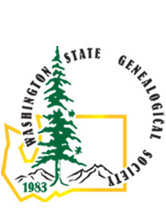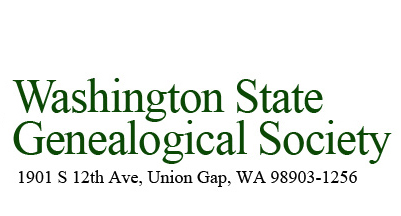This document was last updated on July 19, 2024. Click
here to download a PDF.
- What is the goal of the Washington Pioneer Pursuit challenge?
Our goal is to research and document the family histories of every Pioneer who lived in Washington Territory on or before Statehood was declared on November 11, 1889.
- Who is a Pioneer?
Every man, woman and child who lived in Washington Territory on or before Statehood is considered a Pioneer. It is estimated there were nearly 350,000 people living here in 1889. We encourage researchers to research special populations such as indigenous people, people of color, women and children.
- What is WSGS going to do with the research?
We are making the family histories accessible
online for any interested family history researcher. There is no charge to access the histories and you do not have to be a member of WSGS.
- What format should I use to detail the family histories?
The histories must be in Microsoft Word or a text file. GEDCOMs are not acceptable. Please CAPITALIZE the name of the Pioneer and/or Bold.
See example here.
- How do I get started?
Before beginning your research, we suggest you check the
WSGS Pioneer Index. You may find the Pioneer you’re planning to research has already been researched. If you do find the Pioneer in the index, please send an email to
Washington State Genealogical Society asking to see the genealogical data associated with the pioneer. If you are a WSGS member, you already have access to the complete Pioneer histories in the
Members’ Only section. If you’re not a member, we encourage you to join so you have full access to all the data. It is only $12.00 per year.
We also suggest you take a look at the Hints and Helps document available
here.
- Who can contribute to Pioneer Pursuit?
- Genealogical societies and/or individual genealogists can join the fun. We encourage genealogical societies to focus on their county or area, as you know it best.
- You do not have to be a member of WSGS to participate, but please consider it. To join, click here.
- You do not need to be related to the Pioneer.
- What information are you looking for?
Like all good researchers, you should provide the full name; date and place of birth, marriage and death; name of children; and places he/she lived in Washington (if known). Don’t forget to cite your sources!
- How many generations are you looking for?
At a minimum, we want genealogies for the Pioneer, his/her children, and his/her grandchildren – a total of three (3) generations. If you want to include additional generations, please do so.
Don’t forget that a baby born in Washington Territory on or before Nov. 11, 1889 is still considered a Pioneer, so that baby, his/her children and grandchildren should be included.
- What if some of the Pioneer’s descendants are still living?
If any descendants are still alive, please include only their name and the word “living.”
- What if I find an inaccuracy on my (or someone else’s) Pioneer submission?
If new, more accurate data becomes available on any Pioneer, we will revise the file with the new data immediately following the original data. A notation will be made on the file to show the revision.
- How do I know whether someone else is researching someone I’m interested in doing?
There is no “claim list.” We’re assuming most people will research pioneers in their area (although that’s absolutely not a requirement). If you belong to a local society, we suggest you coordinate within your society. Another excellent resource is to join the
Washington-State-Genealogy@groups.io group. Many people are posting what family or area they’re researching in order to avoid duplication.
- In your index, how do you handle Native American individuals that have a single name (no anglicized surname)?
Before 1900, Native Americans did not have surnames as traditionally used in European or American conventions. As a result, we have used an asterisk (*) in the surname column, noting the individual is a Native American with a single name. If the person is not found under their Indian name, check the anglicized name.
- Are Pioneer Pursuit and the Pioneer Certificate program the same?
No, they’re not the same. The Pioneer Pursuit Program is designed to document every man, woman and child that lived in Washington Territory on or before November 11, 1889. The Pioneer Certificate (and First Citizens) program is a way to purchase a certificate signifying that your ancestor was in Washington Territory on or before statehood. If your ancestor was in Washington on or before December 31, 1900, you may be eligible to purchase a First Citizen Certificate. To get more information about the Pioneer Certificate program, click
here.
- I already have a Pioneer Certificate. Can I use that information for Pioneer Pursuit?
Absolutely! All you need to do is complete the Pioneer Pursuit application form, noting your pioneer ancestor is in the Pioneer Certificate program. We’ll pull the information over from one program to the other.
- In 1861, my ancestral family lived in what is now Idaho, but was Washington Territory at the time. Are they eligible for Pioneer Pursuit?
They sure are. Washington Territory was formed in 1853 and included all of Idaho, Montana and Wyoming. Anyone living in that territory during that time (1853 – 1863) is considered eligible to be a Washington Pioneer.
- Will I be contacted if the reviewer finds an error or anomaly?
Yes. Each submission is reviewed and approved by a member of the review committee to ensure the pioneer lived in Washington Territory on or before Nov. 11, 1889. If the reviewer has questions, he/she will contact you.
While we verify the pioneer was in Washington Territory before statehood, we cannot guarantee the accuracy of subsequent generational data. Every genealogist who uses this data should verify the information given and verify the source materials to make sure all data is correct.
- What if I have more questions?
We’re here to help you. Make sure you review all the documents, including this FAQ and the Example. We also suggest you join the free
Washington State Genealogy group to ask questions, offer help, and coordinate with other Pioneer Pursuit researchers.
If your questions still aren’t answered, email us at
WAPioneerPursuit@gmail.com. Again, we’re here to help you.



